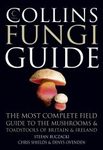About this book
Fundamentals of Molecular Mycology provides a complete overview of recent developments and applications in molecular mycology. It serves as a comprehensive guide for the identification of fungi and the application of fungal biomolecules in agriculture, food, environment, and pharmaceutical sectors by providing detailed information about application molecular markers and bioinformatics tools for mycology.
Covering the most important aspects of molecular mycology, Fundamentals of Molecular Mycology focuses on:
- The application of fungal secondary metabolites in ecosystem management and sustainable agriculture
- The application of DNA recombinant techniques to improve industrially important fungal species
- Different molecular markers and genetic approaches for the taxonomical identification of fungi
- The bioinformatics tool for the identification of fungal species and its secondary metabolites
Advances in molecular tools have created a new path for the mycological research and applications in different sectors. Fundamentals of Molecular Mycology is an excellent source of information on molecular mycology tools and applications in various fields. This book will be valuable to biotechnologists at research institutes, academia, and industry researchers, and professionals. The book is also a rich resources for undergraduate and postgraduate biology students in in mycology, botany, microbiology, fungal biology, biotechnology, and molecular biology as well.
Contents
- Preface
- Molecular Mycology: An Introduction
- Fungal Identification: Conventional Approaches and Current Scenario
- Molecular Tools for Identification of Fungi
- Genetic Improvement of Industrially Important Fungal Strains
- Fungal Strain Improvement Through Recombinant DNA Technology
- Molecular Improvement of Fungal Strains
- Bioinformatic Approaches for Identification of Fungal Species and Detection of Secondary Metabolites
- Fungal Biomolecules and Fungal Secondary Metabolites
- Fungal Biomolecules for Degradation of Xenobiotics and Ecosystem Management
- Fungal Secondary Metabolites for Biocontrol and Sustainable Agriculture
- Molecular Interventions In Fungal Studies for Sustainable Development
- Index
Customer Reviews
Biography
Devarajan Thangadurai, PhD, is senior assistant professor at Karnatak University in South India, president of the Society for Applied Biotechnology, and general secretary for the Association for the Advancement of Biodiversity Science. In addition, Dr. Thangadurai is editor-in-chief of several journals, including Biotechnology, Bioinformatics and Bioengineering; Acta Biologica Indica; Biodiversity Research International; and the Asian Journal of Microbiology. He received his PhD in botany from Sri Krishnadevaraya University in South India. During 2002-2004, he worked as CSIR Senior Research Fellow with funding from the Ministry of Science and Technology, Government of India. He served as Postdoctoral Fellow at the University of Madeira, Portugal; University of Delhi, India; and ICAR National Research Centre for Banana, India. He is the recipient of the Best Young Scientist Award with a Gold Medal from Acharya Nagarjuna University and the VGST-SMYSR Young Scientist Award of the Government of Karnataka, Republic of India. He has edited/authored 15 books including Genetic Resources and Biotechnology (3 vols.), Genes, Genomes and Genomics (2 vols.), and Mycorrhizal Biotechnology with publishers of national and international reputation.
Jeyabalan Sangeetha, PhD, is a GC Kothari Postdoctoral Fellow at Karnatak University, Dharwad, India. Dr. Sangeetha was the recipient of Tamil Nadu Government Scholarship and the Rajiv Gandhi National Fellowship of University Grants Commission from the Government of India for her doctoral studies. She has published several articles on the effect of pollutants on the environment, and she has organized conferences, seminars, workshops, and lectures. Her main research interests are in the areas of environmental microbiology and environmental biotechnology, with particular emphasis on solid waste management, environmental impact assessment, and microbial degradation of hydrocarbons. Her scientific and community leadership has included serving as an editor for the journal Biodiversity Research International and acting as secretary of the Society for Applied Biotechnology.
Muniswamy David obtained his PhD in zoology from Sri Krishnadevaraya University, Anantapur, South India. He joined Karnatak University, Dharwad, South India, in 1995 as assistant professor and advanced to the rank of full professor of zoology in 2012. He has vast teaching and research experience in the fields of ecotoxicology, molecular toxicology, microbial remediation of xenobiotics, and fishery biology. He has published more than 80 papers in national and internationally reputed journals. He has awarded a postdoctoral fellowship by the University Grant Commission, New Delhi, India, and also awarded as "Scientist of the Year-2013" from the National Environmental Science Academy, New Delhi, India. He has successfully handled three major research projects funded by UGC, DST-SERB, and Hutti Gold Mines Pvt. Ltd., Karnataka.



































